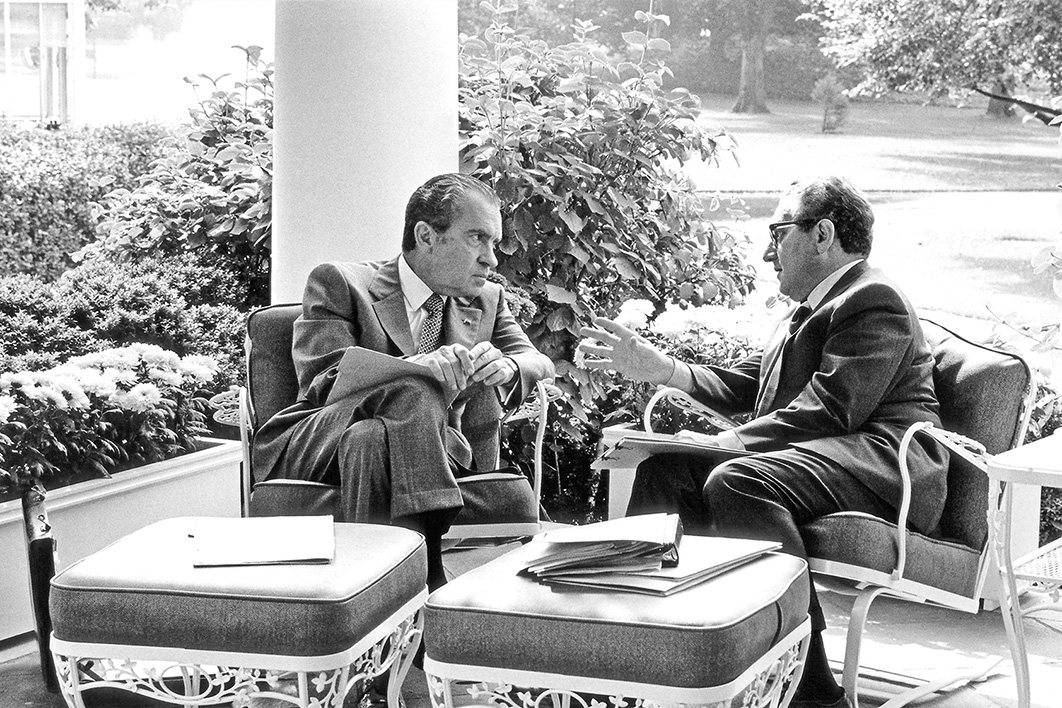First published on 9 June 2023
What was Henry Kissinger thinking on his hundredth birthday last month? He was surely gratified to be feted by the world’s foreign policy elite, who still crave his counsel on today’s global challenges and the reflected glow of his celebrity. The grandees who thronged to various celebrations included US secretary of state Antony Blinken.
But Kissinger’s pleasure was surely mixed with bitterness at the outpouring of vitriol from the anti-imperialist left, who have long condemned him as a war criminal who deserves prison rather than praise. Marking the centenary birthday, Mehdi Hasan on MSNBC said he wanted to talk about “the many, many people around the world” who didn’t get to live even to the age of sixty because of Kissinger. He should be “ashamed to be seen in public,” Bhaskar Sunkara and Jonah Walters wrote in the Guardian.
They and many others trotted out the usual charges from his days as top foreign policy adviser to Richard Nixon and Gerald Ford: brutally and unnecessarily prolonging the Vietnam war, bombing neutral Cambodia, trying to help overthrow a democratically elected leader in Chile, greenlighting the Indonesian invasion of East Timor, abetting genocide in East Pakistan, winking at state torture and killings in Argentina, and more.
The former secretary of state has heard this line of criticism for half a century, and the evidence suggests that it stings. Deeply protective of his honour, he has typically reacted angrily to challenges to his integrity and intelligence. In early 1970, for example, at Johns Hopkins University, a student asked whether he considered himself a war criminal — presumably referring to heavy civilian casualties in the Vietnam war. Kissinger walked out and refused to speak there again for the next twenty years.
In later years, his reaction to such questions changed very little. What did change was his willingness to be put in situations where he could be asked such questions. Being grilled about “crimes” was something that happened only when Kissinger was taken by surprise.
In 1979, for example, British journalist David Frost shocked Kissinger by posing hard-hitting questions about the bombing and invasion of Cambodia. Frost suggested that the policies Kissinger promoted had created conditions that led to the Khmer Rouge takeover and the genocide that left up to two million Cambodians dead. After the first taping, an irate Kissinger complained long and hard to the top brass at NBC, who leaned on Frost to go softer on the famed diplomat in the next taping.
There is little evidence that his skin has thickened since then. In 1999, when Kissinger was plugging the third and final volume of his memoirs, British journalist Jeremy Paxman challenged him about Cambodia and Chile. Kissinger answered, testily, and then walked out. At a State Department event in 2010, historian Nick Turse asked him about the number of Cambodians who were killed in the US bombings. “Oh, come on,” Kissinger said angrily. When Turse followed up later, Kissinger became sarcastic — “I’m not smart enough for you,” he said — and stalked off.
Last month, when Kissinger sat down to talk about his hundredth birthday with his long-time friend Ted Koppel, former host of the popular television show Nightline, he probably expected a softball interview like the ones the American media usually serve him. But Koppel felt obliged to point out that some people consider him a war criminal. He brought up the bombing of Cambodia, intending to suggest that Kissinger had valid strategic reasons for supporting it. “You did it in order to interdict…,” Koppel said, heading to the explanation Kissinger has always given: it was not so much Cambodia that was being bombed, and certainly not Cambodians, but North Vietnamese supply lines.
Kissinger heard only criticism. “Come on,” he interjected in an irritated tone. When Koppel tried to press him on the price Cambodia paid, Kissinger again interrupted with “Come on now.” For Kissinger, the topic is not worthy of discussion.
As this exchange indicates, Kissinger’s belief in his own righteousness is unbudgeable. In his view, then and now, the bombing of Cambodia was a strategic necessity. He long claimed, falsely, that bombs hit areas “either minimally populated or totally unpopulated by civilians.” In fact, American bombs killed and wounded tens of thousands of innocent Cambodians who were simply trying to live their lives in their own villages.
It’s not that Kissinger wants to argue that the costs of his (and Nixon’s) policies were worthwhile. He prefers to ignore the costs altogether. To him, counting the lives lost, in Cambodia and elsewhere, is a distraction. What matters is that the policies he advocated, in his perception, prevented American deaths and led to a more peaceful world order that saved millions of lives — indeed, potentially saved humanity from nuclear conflagration.
Detractors obsessed with the costs are, in his view, disingenuous and even deranged. In the 1970s he sneered at anti-war protesters as driven by “self-hatred.” Dismissing their arguments as irrational, he has said that leftists just want to “feel sorry for themselves.” Those who talk about his alleged criminality, in his view, merely show their “ignorance.” If you question the bombing of Cambodia, he told Koppel, you simply don’t want “to think.”
Hurt and resentful at being denounced, Kissinger has as little empathy for his critics and their perspectives as he had for the Cambodians and others who bore the brunt of his choices. If he had shown anything other than smug indifference to the price paid for his diplomacy, he might have diminished some of the zeal of his tormentors. But he remains locked in a maximalist position: unwilling to express any remorse, he ensures that his antagonists see only his guilt. •




